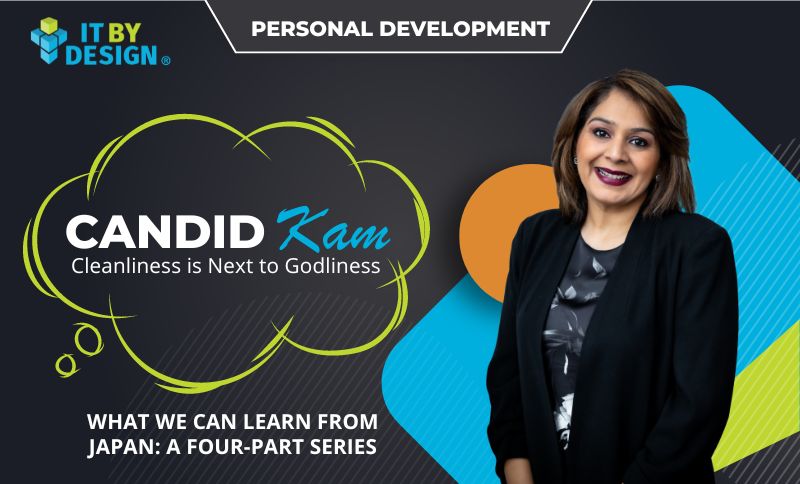This past week, our family traveled to Japan for our anniversary. We’ve been married 25 years, so a big celebration was needed. We decided to take our children with us on a tour of Tokyo, Kyoto, and Osaka, Japan. We have been planning this trip for a full year, and when we finally arrived, we had high expectations—and Japan delivered. There were so many learnings from this wonderful culture that one article alone would not do it justice. So, I’m writing a four-part series. I hope you tune in for all four because there is so much we can learn from this wonderful culture.
We begin with a topic near and dear to my heart: Cleanliness. I have often said that cleanliness is next to godliness—and this society obviously concurs. I was amazed at how clean the streets are. From the train stations to the roads to the taxis, everything is kept meticulously clean. We were actually quite surprised. We have traveled to over 32 countries, and Japan is by far the cleanest that we have ever experienced.
I knew that the Japanese valued cleanliness, since as a society they have you remove your shoes when you enter homes, and even some stores. Kindred spirits, you could say, since, as you all have previously read, I too have a no-shoe policy in my home and am obsessed with cleanliness. I was excited to experience the culture and boy, did it exceed my expectations.
When we first landed, we were famished. So as soon as we arrived at the hotel, we sat in the lobby to get a meal. Every time we sat to eat, there was a wet towel for us to wipe our hands. Not just at the hotel, but in every restaurant as well. Every food item you purchase, whether it’s from a store, in the market, a cart, or a vending machine, will have a wet towelette attached to it for use.
They also don’t have trash bins on the road; you have to go and look for them. Many stores don’t have receptacles available for you. They have bins for you to pour your liquids out and then recycle your cup/plate. The culture itself frowns on wasting food, so most plates are clean when returned to the shop owner. The culture itself is deeply rooted in recycling.
On Day One, we began with our fish market experience. Now, having grown up in Vancouver, I know that there can be a smell that usually comes from these markets. But not in Japan. There was no odor at all. The market was completely spotless. You could not find any garbage on the road anywhere. The streets were completely clean. There wasn’t even a fish smell, although all the food was being cooked. Every shop owner would have their little area where you would eat your food, and then you would give them back the plastic goods once you were done.
On Day Two, we traveled to Mt. Fuji, which was a two-hour drive from our hotel. We traveled through many local areas, and as I would gaze out the window at all of the homes, every home, no matter the size, was extremely well kept. Most of them were well-manicured, but even if there were weeds in the yard, you would not find any garbage or clutter anywhere.
On Day Three, we went shopping in the Japanese version of Times Square—Shibuya. Famous for its crossing, these streets are busier and have more people than Times Square. Again, I was truly shocked because for those of you who have been to busy cities, whether it’s New York, Delhi, Rome, or Paris, we’ve traveled to many of them, and they all have their own distinct smell. But not in Japan. Sanitation workers constantly empty the receptacles, and the people, as a culture, carry their trash with them. It was amazing. You would have to go searching for a trash bin, and even then, there was no garbage on the streets, and no smell.
OK, so I thought, I’m sure public transportation can’t keep this up, but yes, it did. As we traveled to the train station to take the bullet train to Osaka, I can tell you, my jaw literally dropped when I walked into the train station and we made our way to the platform. Spotless. Even as the train passed the other stations, I would look out the window, and nothing. No garbage to be found anywhere. Even the train cars were cleaned and maintained so well. Those of you who have been to Switzerland know that they have a wonderful transportation system, and their trains are extremely well maintained. Or so I thought, until I came to Japan. This is a completely different level. Every ten minutes, an attendant would travel up and down the aisles with trash bags to collect any garbage. So when my son dropped his chocolate on the tray table and picked it up and ate it under the “five-second rule” guidelines, I didn’t even shudder because I was confident that those tray tables had been sanitized.
Even the way that people dress is extremely clean. They are a conservative culture, so you will see mostly pants and longer dresses, and little cleavage. But everyone is very well put together at all times. From the bus and taxi driver, to store attendants, or fast food—you name it, they are all always presentable and well-groomed.
So why this emphasis on cleanliness? It’s part of their religious belief system. There are two dominant religions in Japan—Buddhism and Shintoism. In both, cleanliness is considered a simple but powerful way to improve mental health and keep one’s surroundings beautiful. A people after my own heart 🙂 They believe they are one with nature, and cleanliness is an important part of this religious practice. So, I was right—cleanliness is next to godliness—and not just in my mind. It’s no surprise that Japan is the cleanest country in Asia, and I would say, potentially the world.
Perhaps this is one of the reasons why they live the longest. They remove the clutter from their world to help build a strong mental state—it’s like the satisfaction we get when we clean out our closets or do a spring cleaning—but now imagine it all the time. Think about the satisfaction we get when we finally clean out our inbox or declutter our desks. It helps put us in a better mental state to do our work, and honestly, handle the stresses that we face every day. If there was ever a city I could see myself living in, it is here. My family has always said that I take cleanliness very seriously. LOL, they ain’t seen nothing yet! 🙂
Previous Candid Kam: Can We Call Our Kids Moochers?








